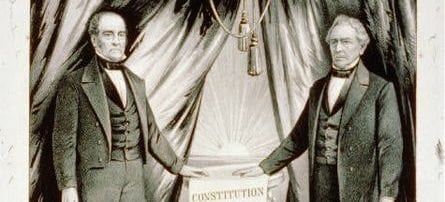It is stated that there are certain members of Congress, representing large slaveholding constituencies, who have openly declared their preference for reconstruction, with Federal guaranty of slavery, to the emancipation of slaves [by the Confederacy] as a means of securing the independence of the Confederate States.
…Can it be possible that men representing slaveholding constituencies would prefer returning to the Union to the dedication of their property to the cause of independence.
What constituted the proximate cause of this war? The prohibition of slavery extension and the unwarrantable interference with its institution of slavery within the States.
Why have our people rallied to this cause? Only because they regarded it one form of interference with the rights of property within the States.
Is the army of defence composed exclusively of slaveholders? They have responded nobly in the vindication of the public rights. They have contributed their means and their lives to the common defence. But, as a class, they have enjoyed certain practical exemptions from the general conscription.…
Now what contributions to the cause have been made by the non-slaveholding sections of this and other States? Take the Valley of Virginia for instance. There the slave property has been carried away; the houses burned and the country abandoned to conflict between the contending armies. The men from this region have endured the fate of war.–They have been mutilated and beggared by the war. They have lost the special interest which in chief part occasioned the war.–Have they flinched from or abandoned the cause because their interest in the cause has been extinguished? On the contrary, they cling the closer to the principles of independence when their property interest in its preservation has been diminished.
Can it, then, be possible that those so deeply interested in the cause as the slaveholders from the interior of the cotton States should prefer, under any circumstances, the security of their property to the independence of those States? It would be in effect to say to all other interests: “You have fought for the integrity of slave title, your country has been desolated, your lives and limbs have been sacrificed to the success of this object, but we doubt your ability to guarantee, by your valor, the safety of our title. You even propose to sacrifice this title to the success of your cause. As the object of the war was the safety of slave title, we must seek that object by another course. We shall throw ourselves upon the protection of the enemy. They will grant us, at least, the temporary use of our own slaves.”
This is the alleged proposition of certain slave-holding members translated. We cannot admit that any sacrifice of interest or institution is too great to be made, if such sacrifice will secure peace and independence. We repeat, that we do not believe emancipation will secure independence and we would not, therefore, make the experiment.
But if any ill-advised slaveholder should resort to reconstruction for the protection of his property, let us see what he would gain.… A proposition has been introduced in the Federal Congress for so amending the Constitution as to authorize the abolition of slavery.
…It is said…that [the U.S.] Congress will adopt the measure during the ensuing session.… How long, then, would the protection of slavery last? For how many months or days? Long enough, say some, to reap the profits of their labor for the maintenance of their owner. Then we should have a premature peace to secure to a comparative few this temporary use of their property? These men would have given life, limb, property, and a great cause, for the special gain of a few.
…It would be a singular spectacle if it should appear that either one of those States, which invited Virginia into this conflict, finding their interests likely to suffer by the further prosecution of the war, should compound for their own safety, by surrender of the principles of State Sovereignty involved in the war.








































































































































































































